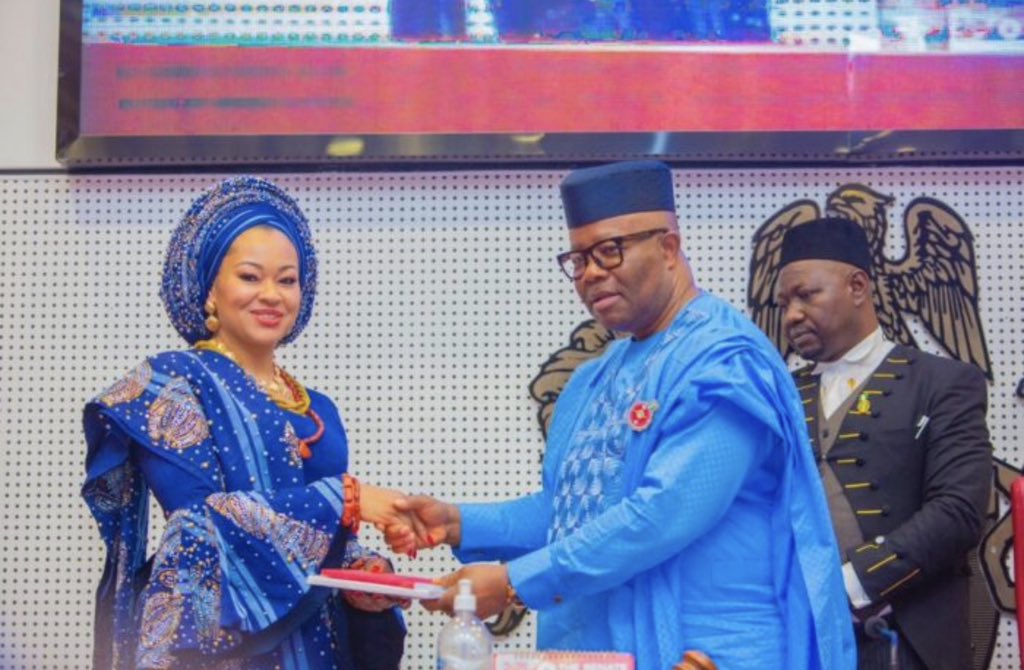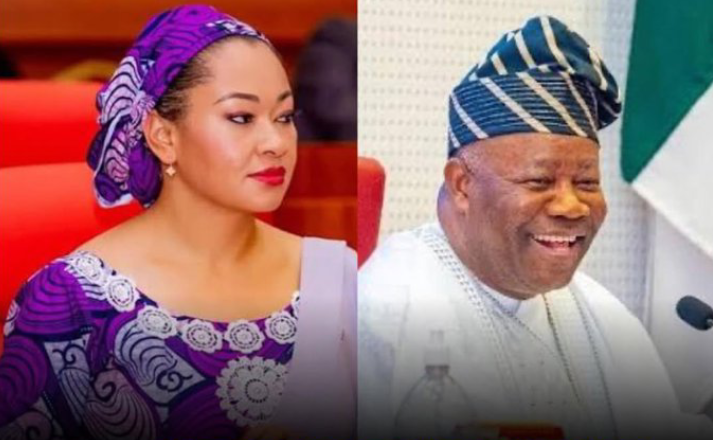
Senator Natasha Akpoti-Uduaghan’s Surprise Olive Branch to Akpabio Signals New Political Harmony

In a surprising yet heartwarming political development, Senator Natasha Akpoti-Uduaghan of Kogi Central has extended an olive branch to Senate President Godswill Akpabio, inviting him and fellow lawmakers to the commissioning of projects in her constituency. The invitation, which Akpabio personally read during Thursday’s plenary session, has been widely interpreted as a significant gesture of reconciliation following months of tension between the two influential senators.
The Kogi lawmaker, who represents the People’s Democratic Party (PDP), penned the letter herself and addressed it to her colleagues in the Senate, inviting them to join her in celebrating the completion and unveiling of several community development projects in Ihima, Kogi State. The event, slated for Sunday, forms part of the activities marking her second year in the Senate — a milestone she intends to commemorate not with pomp and politics, but with tangible evidence of service to her people.
In the letter, which Akpabio read to the chamber, Akpoti-Uduaghan wrote: “In marking my second-year anniversary as a serving Senator of the Federal Republic of Nigeria, I wish to invite fellow Distinguished Senators to join me for projects commissioning in Kogi State.” The invitation contained precise details, noting that attendees would converge at her residence on Plot 101, Jimoh Akpoti Street, Ihima, Okene, and that senators arriving by air could land at the Obajana Airstrip before proceeding to the venue by road.
The tone of the letter and the Senate President’s response have sparked widespread political speculation. When Akpabio finished reading the invitation, he paused briefly before saying with a calm smile, “Congratulations in advance.” It was a brief but symbolic acknowledgment that hinted at a possible thaw in what had been one of the most notable political rifts within the upper chamber this year.
Only months ago, the relationship between the two lawmakers appeared irreparably damaged. The tension peaked earlier this year when Akpoti-Uduaghan was suspended from the Senate for six months following a heated controversy over the reallocation of Senate seats in Kogi State. The dispute had cast a shadow over her tenure and raised questions about fairness and internal politics in the Red Chamber.
On March 6, Akpoti-Uduaghan’s suspension was announced after an intense plenary session that drew both public criticism and private sympathy. Her supporters described the move as politically motivated, while others in the Senate saw it as a necessary disciplinary measure. But even amid the friction, Akpoti-Uduaghan maintained a measured tone publicly, promising to return “stronger, wiser, and even more committed to service.”
True to her word, when the Kogi Senator returned to plenary on September 24 after her six-month suspension, she did so with quiet determination and renewed focus. Her reemergence was marked by an immediate contribution to the debate on the Criminal Code Act (Amendment) Bill, 2025 — a move that signaled she was not interested in grudges but in governance. Since then, her participation has grown steadily, earning her bipartisan acknowledgment for her resilience and constructive engagement.
The latest invitation to Akpabio, therefore, carries deeper political meaning beyond the ceremonial. It suggests a deliberate attempt to rebuild bridges and foster unity within the Senate, especially between members across party lines. Observers note that in a political climate often defined by rivalry and polarization, Akpoti-Uduaghan’s gesture sends a powerful message — that leadership sometimes means extending goodwill even to those with whom one has disagreed.
Political analysts also point out that the timing of the invitation is strategic. As the Senate approaches key legislative deadlines and prepares to deliberate on sensitive national issues such as the 2026 budget framework and the implementation of economic reforms, a more cohesive chamber could prove crucial. By reaching out to Akpabio, Akpoti-Uduaghan not only reinforces her relevance in national politics but also positions herself as a symbol of collaboration and reconciliation.
The Kogi Central Senator’s grassroots popularity has long been a cornerstone of her political strength. Known for her fiery independence and passionate advocacy for women, youth, and local enterprise, Akpoti-Uduaghan has consistently maintained that her political mission is “to bridge the gap between governance and the governed.” Her decision to mark her Senate anniversary with project commissioning rather than a grand celebration underscores her commitment to community impact over personal acclaim.
The people of Ihima, Okene, and surrounding communities are already preparing to welcome not just their Senator but a host of national figures for Sunday’s event. Local reports indicate that anticipation is high, with several completed infrastructure projects — including renovated schools, rural road rehabilitation, and healthcare facilities — expected to be unveiled. For residents, the projects represent more than political symbolism; they are proof that representation can indeed translate to results.
Meanwhile, within the political corridors of Abuja, talk of a possible reconciliation between Akpoti-Uduaghan and Akpabio has gained traction. Sources close to the Senate leadership reveal that informal back-channel communications between the two offices have been ongoing since her return to plenary. “The Senate President has always maintained that there’s no permanent enmity in politics,” a source said. “He respects her courage and believes in giving everyone a fair platform to serve.”
For her part, Akpoti-Uduaghan has refrained from public commentary on the alleged reconciliation, preferring to let her actions speak. By extending an invitation directly to the Senate President, she has demonstrated not only political maturity but also a readiness to move past past grievances. It’s a move many within and outside her party see as emblematic of her pragmatic approach to politics — one that places national service above personal pride.
Observers believe Sunday’s commissioning in Ihima could become a symbolic turning point in the Senate’s internal dynamics. If Akpabio attends — as many expect he will — it would mark the first public appearance of the two senators together since her suspension. Such an image, captured before cameras and broadcast across the nation, would send a strong message of reconciliation and political renewal at a time when Nigerians are yearning for unity among their leaders.
As political watchers wait to see how the weekend unfolds, one thing is clear: Natasha Akpoti-Uduaghan has once again proven that she is not one to fade quietly into the background. Whether facing political headwinds or navigating alliances, she continues to assert herself as a force within Nigeria’s evolving democratic landscape — principled, bold, and unafraid to extend a hand even to those once across the aisle.
Her gesture to Akpabio may not erase past conflicts, but it has certainly reignited hope for a Senate that can rise above factionalism. In the often turbulent theatre of Nigerian politics, such moments of humility and reconciliation are rare — and when they occur, they remind the nation that progress often begins with something as simple as an invitation.
As the convoy of lawmakers heads to Kogi this weekend, all eyes will be on Ihima — not just to celebrate new projects, but to witness whether a new chapter of political harmony is truly being written between two of the Senate’s most talked-about figures.

